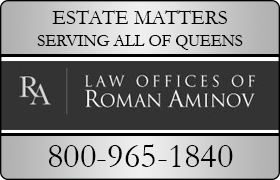Howard Beach Trusts Lawyer, New York
Sponsored Law Firm
-
 x
x

Click For More Info:
-
The Law Offices of Roman Aminov
147-17 Union Turnpike Flushing, NY 11367 » view mapElder Law, Probate, Estate Planning Free Inital Phone Consultation
The Law Offices of Roman Aminov is a client centric trusts and estates practice concentrating in estate planning, elder law, and probate.
800-965-1840  Roman Aminov
Flushing, NY
Roman Aminov
Flushing, NY Attorney At Law - New York, 2011
 Testimonials
Testimonials"Roman went out his way to help me. He made several attempts to contact me."
 Contact UsEmail or Call 24/7
Contact UsEmail or Call 24/7Call for free initial consultation,
800-965-1840.
Irina Yadgarova
✓ VERIFIEDEstate, Wills & Probate, Trusts, Elder Law
Providing outstanding legal services and counsel in the areas of Estate, Probate and Elder Law.
Attorney Irina Yadgarova focuses her practice on Trusts & Estates, Probate & Administration, Elder Law, and Real Estate. She is licensed to practice l... (more)
Miriam Lazofsky
Real Estate, Trusts, Contract, Bankruptcy
Status: In Good Standing Licensed: 68 Years
Seth M Goldstein
Real Estate, Wills & Probate, Trusts, Accident & Injury
Status: In Good Standing Licensed: 47 Years
George Klein
Real Estate, Trusts, Elder Law, Wills & Probate
Status: In Good Standing Licensed: 40 Years
Jerome Plotner
Commercial Real Estate, Wills, Trusts, Estate Planning
Status: In Good Standing Licensed: 72 Years


 Testimonials
Testimonials Contact UsEmail or Call 24/7
Contact UsEmail or Call 24/7

